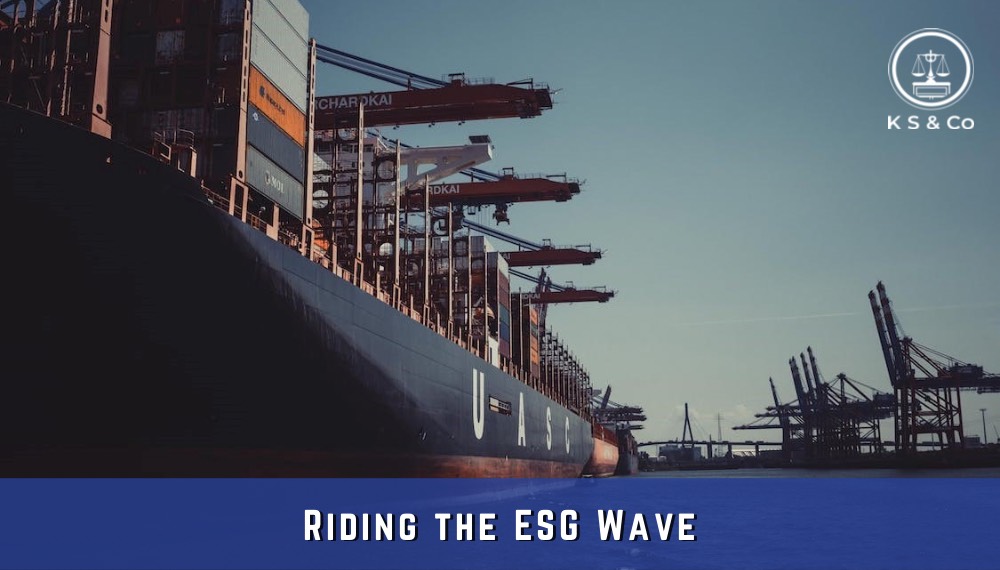In an era marked by increasing concerns over environmental, social, and governance (ESG) issues, shipping companies find themselves at a crossroads, as they need to prioritize between profits and sustainable practices. In case, the shipping company is part of the top 1000 listed companies by market value, it is mandatory for them to provide a report called the Business Responsibility and Sustainability Report (BRSR). .
The imperative to adopt ESG policies and publish comprehensive annual reports has become an essential aspect of sustainable business practices. By doing so, shipping companies can fortify relationships with stakeholders, highlight their dedication to sustainability, attract investors, and align with future regulatory demands.
This article delves into the compelling reasons why shipping companies should embrace ESG practices and produce annual reports, underscoring the impact on stakeholders, the pivotal role of the Poseidon Principles, and the inevitable advent of forthcoming ESG regulations in the maritime industry. By delving into the legal landscape, financial implications, and reputational risks associated with non-compliance, this article also offers a comprehensive understanding of the urgent need for businesses in India to prioritize ESG compliance.
ESG non-compliance within the Indian shipping and transport industry can have dire financial consequences for businesses. Investors and financial institutions are increasingly considering ESG policies when making investment decisions. Non-compliant companies may face challenges in securing financing, experience higher borrowing costs, and encounter limited access to capital. In addition, non-compliance can lead to decreased market value, reduced investor confidence, and credit rating downgrades. For import-export businesses, non-compliance may result in delays at customs, leading to financial losses and disruptions in the supply chain. Furthermore, non-compliant entities may face exclusion from government tenders and restrictions on participating in certain projects, hampering growth prospects.
ESG non-compliance within the Indian shipping and transport industry also poses significant reputational risks. In an era of heightened stakeholder scrutiny, companies failing to adhere to ESG standards risk damaging their reputation. Negative media coverage, public backlash, and loss of trust from customers, investors, and the wider community can have lasting effects. The interconnected nature of global supply chains means that non-compliant practices by one entity can tarnish the reputation of the entire supply chain, leading to strained business relationships and potential loss of valuable contracts. Rebuilding trust and restoring reputation can be a challenging and time-consuming process, affecting a company’s growth and sustainability.
Legal Consequences
In the landmark judgement of Samit Mehta v Union India[1], the principle of ‘polluter pay’ and ‘precautionary principle’ was reaffirmed by the National Green Tribunal. The Tribunal also recognised the right to clean environment under Article 21 of the Constitution of India. In this case, the negligence of the Respondent caused a ship containing coal, diesel and fuel oil to sink causing irreparable damage to the marine ecosystem. The Tribunal held that the ship sinking caused damage to the marine environment on three points, “(a) Dumping of the cargo on the ship, i.e., coal in to the sea; (b) Release of the Fuel oil stored on board and the resultant oil spill caused by it and (c) wreckage of the ship itself, which contained the materials.” [2] Ultimately, the Respondents were charged with a fine of Rs. 100 Crore (Rupees One Hundred Crore) and this was considered to be one of the biggest fines given to a shipping company by the Tribunal. Having the principle of ‘polluter pay’ is helpful when it comes to tackling the pollution already caused and creating facilities to prevent pollution. It also acts as a deterrent.
India has signed and ratified the International Convention for the Prevention of Pollution from Ships, 1973, also known as the MARPOL Convention, including the various annexes. The prevention of pollution by ships is addressed in the Merchant Shipping Act, 1958, along with its amendment in 2003. Compliance involves obtaining certifications such as the International Oil Pollution Prevention Certificate and adhering to equipment construction requirements to prevent noxious liquid spills. The Director General of Shipping has the authority to enforce the provisions of the MARPOL Convention. If a ship lacks the necessary certificates or violates the Merchant Shipping Act, 1958, it can be detained or held accountable for the costs associated with pollution.
The top 1,000 listed entities by market capitalization are obligated to provide a report called the Business Responsibility and Sustainability Report (BRSR). This report includes disclosures concerning the entity’s significant environmental, social, and governance (ESG) risks and opportunities, strategies to mitigate or adapt to these risks, financial implications, sustainability goals, targets, and performance, as well as environmental disclosures regarding resource utilization (such as energy and water). Failure to comply with these requirements can result in fines, suspension, or revocation of trading for the listed entity.
The Merchant Shipping Bill, 2020 seeks to replace the Merchant Shipping Act, 1958. It incorporates all International Maritime Organization (IMO) conventions and protocols that India is a party to. This adoption also includes Annex VI, i.e., IMO’s Energy Efficiency Existing Index as well. By implementing this bill, significant reductions in carbon emissions from ships can be achieved, encouraging shipping companies to transition to more energy-efficient vessels.
[1] Samit Mehta v Union of India Manu. NGT. 0104 (2016)
[2] Samit Mehta v Union of India Manu. NGT. 0104 (2016)

Strengthening Relationships with Stakeholders:
The ‘social’ aspect of ESG entails the cultivation of robust relationships with various stakeholders, including employees, suppliers, customers, and local communities. By adopting ESG practices and publishing annual reports, shipping companies can enhance these relationships significantly. Transparent reporting enables stakeholders to understand a company’s values, objectives, and performance, enabling them to make informed decisions regarding their involvement with the company. Implementing ESG initiatives encourages heightened employee satisfaction, improved supplier relationships, enhanced customer loyalty, and a positive socioeconomic impact on local communities.
The Poseidon Principles and Environmental Accountability:

Addressing the environmental aspect of ESG assumes paramount importance when mitigating the adverse impact of the shipping industry on the planet. The Poseidon Principles, an innovative framework introduced by prominent financial institutions such as Citi, Societe Generale, and DNB, govern the environmental dimension of ESG for shipping companies.
There are four basic principles, which are the Principle of Assessment, the Principle of Accountability, and the Principle of Enforcement and last the Principle of Transparency.
Within the realm of ESG compliance, a set of fundamental principles illuminates the path for shipping companies. The Principle of Assessment sheds light on carbon dioxide emission concentrations, revealing the extent of environmental impact. Meanwhile, the Principle of Accountability ensures the utilization of approved means and tools for conducting assessments, aligned with organizations like the International Maritime Organization (IMO). In parallel, the Principle of Enforcement ensures the inclusion of appropriate clauses in loan financing agreements to enable accurate measurement of set objectives. Lastly, the Principle of Transparency emphasizes the commitment of all parties involved to adhere to these principles with openness and sincerity. Together, these principles form a cohesive framework that guides shipping companies on their ESG compliance journey. These principles implore lenders to consider climate-related risks associated with their shipping portfolios and promote the adoption of sustainable practices. Shipping companies that co-sign the Poseidon Principles unequivocally demonstrate their commitment to reducing greenhouse gas emissions and aligning with the objectives of the Paris Agreement. By embracing the Poseidon Principles, shipping companies not only contribute to the fight against climate change but also attract a broader base of investors seeking ESG-linked investments.
Attracting Investments through ESG-Linked Shipping Finance:
The advent of ESG-linked shipping finance has heralded a significant paradigm shift in the shipping industry. Banks and financial institutions increasingly factor ESG considerations into their investment decisions. Shipping companies that adopt ESG practices and publish annual reports stand to benefit from attracting investments from these institutions. ESG-linked financing offers enticing advantages such as lower borrowing costs, access to a wider investor base, and an enhanced reputation and credibility. By demonstrating their unwavering commitment to ESG, shipping companies can tap into the growing pool of responsible investors who prioritize sustainability as a key driver of long-term value.
Conclusion:
Indian shipping and transport industry will face significant legal, financial, and reputational consequences upon failure to prioritize ESG compliance. The Samit Mehta v Union India case exemplifies the devastating impact of non-compliance, where the shipping company incurred fines, and reputational damage. In an era where sustainable business practices are pivotal for long-term growth and survival, shipping companies must prioritize transparency, accountability, and environmental stewardship. By strengthening relationships with stakeholders, embracing the Poseidon Principles, attracting investments through ESG-linked finance, and preparing for future ESG regulations, shipping companies can chart a course toward sustainable success.
Furthermore, non-compliance has profound financial implications, including limited access to capital, higher borrowing costs, and reduced market value. Reputational risks arising from non-compliance can lead to negative media coverage, loss of customer trust, and strained business relationships. By proactively adopting and adhering to ESG standards, companies can mitigate legal risks, enhance financial stability, and safeguard their reputation. The interconnectedness of the import-export sector necessitates a comprehensive approach to ESG compliance, ensuring the integrity of supply chains and promoting responsible practices. Recognizing the jurisdiction-specific legal landscape and the industry’s impact on international trade and commerce is imperative for businesses seeking to thrive in the Indian context. Through a commitment to ESG compliance, businesses can foster a sustainable future while reaping the benefits of enhanced legal compliance, financial stability, and stakeholder trust.
References
- Samit Mehta v Union of India Manu. NGT. 0104 (2016)
- Source: McKinsey & Company – “ESG: What’s Next in Shipping and Ports”
- Source: Poseidon Principles
- Source: Lloyd’s Register – “Green Ship Finance: The Path to Zero-Emission Shipping”
- Source: International Maritime Organization – “Initial IMO Strategy on Reduction of GHG Emissions from Ships”







